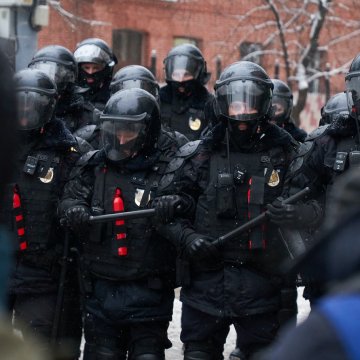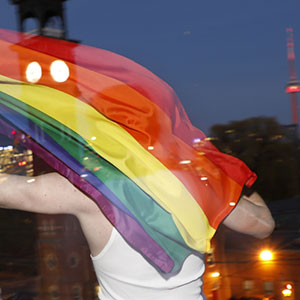- About
- Topics
- Picks
- Audio
- Story
- In-Depth
- Opinion
- News
- Donate
- Signup for our newsletterOur Editors' Best Picks.Send
Read, Debate: Engage.
| topic: | LGBT Rights |
|---|---|
| located: | Russia |
| editor: | Katarzyna Rybarczyk |
Under Vladimir Putin’s rule, which is characterised by blind devotion to “traditional values,” LGBTQ identities and same-sex relationships are perceived as existential threats to the nation’s prosperity. Although homophobic rhetoric has long been at the heart of Russia’s domestic policy, recently Russia has tightened its grip on the LGBTQ community’s human rights.
On 5 December, Putin signed a law criminalising any favourable public mention or depiction of LGBTQ topics, including in speech, film, books, advertising and online. Individuals and organisations found promoting and expressing support for “nontraditional sexual relations” can receive fines, and foreigners could face up to 15 days of arrest, as well as expulsion from Russia.
The new bill - which broadened the regulations introduced in 2013 that made spreading information about LGBTQ lifestyles to minors illegal - is part of an “ongoing homophobic government campaign against LGBTQ rights,” said Igor Kochetkov, the head of the Russian LGBTQ Network.
As Russian public support for the invasion of Ukraine decreases and the Russian military loses ground on the battlefield, the timing of the new law’s introduction is not random: Russia is targeting the LGBTQ community in an attempt to draw attention away from the backfiring of its “military operation” in Ukraine.
“The war is not going well so they are trying to turn the public discourse to some sort of scandal,” explained Vsevolod Galkin, a photographer and director who used to work for Kvir, a Russian gay magazine.
Victimising the LGBTQ people to achieve political gains represents a crackdown on their already-limited freedom of expression. Following the introduction of the first version of the “gay propaganda” law, human rights activists reported a noticeable increase in hate crimes and violence against LGBTQ people. As the new bill continues to enable homophobic behaviour, there is a risk of more frequent attacks on LGBTQ people.
As a consequence of making LGBTQ identities taboo, Russia’s new law is likely to negatively affect the mental well-being of people in the community. “There is a possibility that the number of mental problems among queer people, and especially teenagers, may increase significantly due to the fact that they will have to hide more and more strenuously,” observed Noel Shaida from the recently-liquidated Sphere Foundation, a Russian LGBTQ rights organisation.
Research shows that after the introduction of the 2013 law, Russia saw a rise in suicide cases among LGBTQ youth. Now the rules have become even more restrictive, increasing the likelihood of higher suicide rates too, especially as the quality of mental health services available to LGBTQ people has been compromised. Some mental health providers in Russia have to self-censor to avoid breaking the law and are therefore unable to provide “honest, scientifically accurate, and open counselling services,” revealed a report published by Human Rights Watch.
LGBTQ people in Russia have found themselves in a hostile climate where they face significant barriers to accessing their fundamental rights. Promoting values of acceptance and equality, the international community should call upon the Russian government to put an end to state-sponsored stigmatisation of the LGBTQ community. In the meantime, to reduce the side-effects of this persecution, international institutions should play a role in ensuring that Russia’s LGBTQ youth can access psychological support and adequate counselling services.
Photo by Valery Tenevoy

